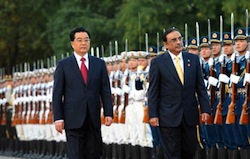Today's top nuclear policy stories, with excerpts in bullet form.
Stories we're following today, Monday, June 21, 2010:
Time to Act Responsibly on Nukes - Zia Mian and Daryl Kimball in The Press [link [1]]
- Global efforts to prevent the spread of the world's most deadly weapons depend on universal compliance with rules that constrain the sale of nuclear technology.
- Too often, however, powerful states try to make exceptions from these rules, or simply ignore them, as a way to help their allies and to make money for their nuclear industries.
- Approving the sale of Chinese reactors to Pakistan, or turning a blind eye to such a sale, would weaken both the Nuclear Suppliers Group and the Nonproliferation Treaty.
- Notwithstanding the 2008 exemption for nuclear trade with India, responsible states, like Japan and Australia, should resist commercial pressures for engaging in nuclear trade with India, which would feed the nuclear fire in South Asia.
China-Pakistan Deal May Come Up at NSG - United Press International [link [2]]
- The Nuclear Suppliers Group's meeting in New Zealand may give members a better take on the China-Pakistan nuclear-generating deal.
- In 2008, the United States and other major powers helped India win a special exemption from the NSG for an Indo-U.S. civilian nuclear deal, although India, like Pakistan, has not signed the Nuclear Non-Proliferation Treaty.
- But Pakistan, a close ally of China, has not been able to get a similar deal from the United States because critics say Pakistan does not have a good proliferation record.
- A Washington Post report last week said the administration of U.S. President Barack Obama planned to object to the China-Pakistan deal.
Congress Needs Bigger Role in Arms Control - Matthew Rojansky and Andrew Semmel in Roll Call [link [3]]
- START ratification is important, but an equally important long-term outcome is the ability of Congress to participate productively in nuclear security and arms control discussions and to provide meaningful oversight of treaty-based international security.
- The Senate should revive the Arms Control Observer Group, a bipartisan panel that played a key political and substantive role during the Reagan administration’s negotiations with the Soviet Union.
- An effective Senate debate on new START must also get beyond not only Capitol Hill but the Washington Beltway altogether. One way to engage more ordinary Americans in the ratification discussion is to hold hearings outside of Washington as Congress has done on other sensitive issues.
- A better process for this debate can also set high standards for future U.S. policy and treaty deliberations, yielding long-term gains for American national security.
Iran Bars U.N. Inspectors in Escalating Nuclear Row - Reuters [link [4]]
- Iran has barred two U.N. nuclear inspectors from entering the Islamic Republic, adding to tension less than two weeks after Tehran was hit by new U.N. sanctions
- Officials accused the two unnamed inspectors of providing false information in a report by the International Atomic Energy Agency (IAEA) and declared them persona non grata.
- They made clear Iran would still allow the Vienna-based U.N. agency to monitor its nuclear facilities, saying other experts could carry out the work.
- Iran has branded the sanctions "illegal" and lawmakers have warned of a scaling-back of ties with the IAEA.
Iran and the European Moment - Emanuele Ottolenghi in The Wall Street Journal [link [5]]
- Last week, only days after a U.N. Security Council Resolution introduced new sanctions against Iran, Europe's leaders approved guidelines to expand their scope.
- Given that Europe is Iran's main trading partner, a bold move now could have devastating implications for Ahmadinejad, Khamenei & Co. But will Europe go far enough?
- By banning exports, investments, and transfers of technology in strategically critical areas of Iran's energy sector, the [EU] could set back for years Iran's efforts to modernize its technologies, and cut the regime's financial lifeline at a time when it is particularly vulnerable internally.
- Ultimately, France, Britain, and the Netherlands must convince the rest [of Europe] that nuclear weapons in the hands of Iran's leaders, and the arms race in the Middle East that would likely follow, would be a menace to all they cherish.
A View from the Dark Side
"New START" Leads to Bad End - James Carafano in The Washington Examiner [link [6]]
- That's the great tragedy of Obama's "road to zero": It is likely to achieve the opposite results of its aim. A deliberately self-weakened United States will exert little influence on the nuclear inventories and programs of other nations.
- Rather, potential competitors will feel emboldened. They'll step up their programs. Allies will feel increasingly insecure and take matters more into their own hands.
- The gateway to this road to disaster is the New START agreement that the president wants Congress to ratify. It's a bad agreement. It makes Russia a more dominant nuclear power, and it makes Russia more, not less, dependent on nuclear weapons.
Featured Image
Topic
- Early Warning [8]
